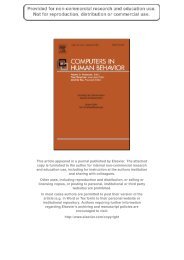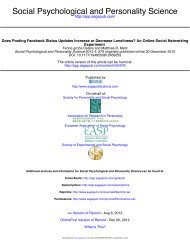Varnhagen.pdf
You also want an ePaper? Increase the reach of your titles
YUMPU automatically turns print PDFs into web optimized ePapers that Google loves.
724 C. K. <strong>Varnhagen</strong> et al.<br />
5 months). The distribution of ages for boys and girls was roughly equivalent<br />
(M = 14 years, 6 months, SD = 1 year, 2 months, Mdn = 14 years, 6 months for<br />
girls and M = 14 years, 3 months, SD = 1 year, 6 months, and Mdn = 14 years,<br />
2 months for boys). The participants represented a convenience sample, that is, they<br />
were known by student researchers conducting the study as part of a senior level<br />
course in developmental psychology. Participants were average to above average in<br />
spelling ability, with a mean standardized score on the Wide Range Achievement<br />
Test (WRAT-3; Wilkinson, 1993) Spelling subtest of 110.7 (SD = 13.1). An<br />
independent t-test comparing WRAT-3 Spelling subtest scores revealed no statistical<br />
significance between girls (M = 109.2, SD = 12.2) and boys (M = 112.8,<br />
SD = 14.4).<br />
Apparatus and materials<br />
Each adolescent participant was required to have access to the Internet as well as an<br />
instant messaging program (e.g., MSN, AIM) on their computer. None of the instant<br />
messaging programs used by the participants had spell check or word completion<br />
options. In addition, the participants were required to be familiar with using and<br />
saving conversations through the instant messaging program and, if unsure, the<br />
researcher clarified instructions on how to save this type of information.<br />
We used the WRAT-3 Spelling subtest to assess spelling ability. The test<br />
includes 40 words progressing in difficulty. To ensure that all participants received<br />
the same pronunciation, we created a digital recording of each of the words and<br />
context sentences. A member of the research team prepared the digital recording.<br />
Each word-context sentence-word recording was saved as a separate audio file to be<br />
delivered over the file sharing component of the instant messaging program.<br />
Procedure<br />
Written informed consent was obtained from a parent and oral or text (via instant<br />
messaging) assent was obtained from the adolescent participant prior to the start of<br />
the study. The student researcher asked the participant to save all computer-based<br />
instant message conversations for 1 week and, if the participant was unsure, the<br />
researcher provided instructions to save this type of information. Normal instant<br />
messaging conversations over the course of 1 week were then saved by the<br />
participant, and sent at the end of the week to the researcher.<br />
Following the 1-week data collection period, the researcher administered the<br />
WRAT-3 Spelling subtest to the participant. The digitally recorded words were sent<br />
individually over the Internet through the same instant messaging program the<br />
participant had used to record his or her instant messages. The participant listened to<br />
each word-context sentence through an audio file, typed the spelling on a word pad<br />
document with spell check turned off, then sent the word list via email or instant<br />
messaging to the researcher.<br />
From the collected instant messaging conversations, the researcher selected all<br />
messages that were written by the participant and discarded all messages written by<br />
others. The researcher then selected a random start point in the document and<br />
123
















